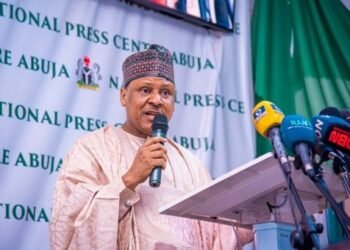By Ikenna Uwadileke
Successful implementation of the African Continental Free Trade Agreement (AfCFTA) in Nigeria requires active involvement of state governments.
The declaration was made in Abuja on Tuesday by Mr Yonor Asan, Director-General, Free Trade Agreement, at a subnational strategy workshop with the theme: “Creating Economically Viable Communities.’’
Asan represented the Minister of Industry, Trade and Investment, Otunba Adeniyi Adebayo, at the workshop.
The event was organised by the National Action Committee on AfCTFA in collaboration with the Nigerian Governors Forum.
Asan said that the national AfCTFA implementation plan needed to cascade down to the subnational level and grassroots for optimal results.
According to him, each state needs to develop and execute its own AfCFTA strategy.
He, however, emphasised the need to support states in the development of a framework to identify their areas of distinctive competitiveness.
“Our expectation is that through the plans and discussions that will hold at this event, states’ internally-generated revenues will make quantum leaps.
“Business will expand domestically and continentally, unemployment will reduce and our overall economy will become healthier,’’ Asan said.
He noted that AfCFTA would eliminate 90 per cent of tariffs on tradable goods over a five-year period for developing countries and 10 years for least developed countries.
“This will expand market access for Nigeria’s exporters of goods and services which will in turn catalyse production growth and boost job creation in the Nigerian economy,’’ he said.
In a keynote address, Gov. Kayode Fayemi of Ekiti State stressed the need to break ideological limitations to overcome challenges limiting trade on the continent.
Speaking as Chairman of the Nigerian Governors Forum, Gov. Fayemi said: `we need to avail ourselves of opportunities by agreeing to the fact that we need to break down barriers.
“AFCFTA has created new business opportunities for multiple sectors while increasing direct investment in the economy.
“With AFCFTA, Nigeria is well on its way to becoming a multi-sector giant.
“However, this growth can be achieved better by availing ourselves the opportunities enshrined within the AFCFTA with new and improved trade opportunities.’’
He added that Nigeria needed to embrace trade facilitation, noting that this would happen only if artificial borders were removed.
“Trade facilitation is what will make AfCFTA work better in our environment,’’ he stressed.
In his remarks, Mr Francis Anatogu, Secretary, National Action Committee on AfCFTA, said the workshop was designed to develop a plan to domesticate the agreement which was signed in July 2019 for implementation at the subnational level.
According to Anatogu, the objective is to distil significant opportunities for Nigeria that drives job creation and capacity building in the states.
He pointed out that Nigeria with a high number of multi sector professionals compared to other regional markets should be able to expand knowledge and expertise across borders.
“Also within the country, states can improve their capacity through the exploitation of endowments, knowledge and skills.
“State can stimulate job creation in various sectors through investments and implementation of development plans,’’ Anatogu said.
(NAN)










